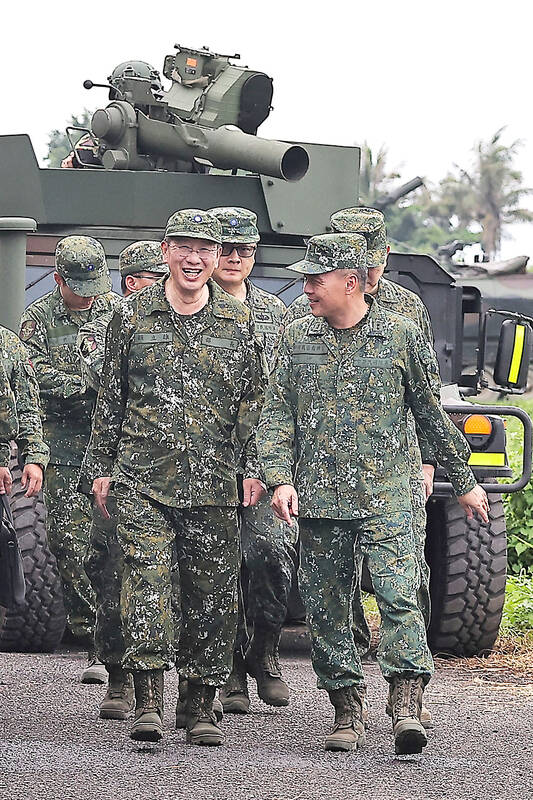Taiwan must show it is determined to defend itself no matter who wins the US presidency, Minister of National Defense Wellington Koo (顧立雄) said yesterday as the US election campaign entered its final hours.
Former US president Donald Trump — the Republican presidential candidate, who was neck and neck in the polls with US Vice President Kamala Harris of the Democratic Party — has made comments on the campaign trail that Taiwan should pay to be protected and also accused it of stealing US semiconductor business.
Taiwan has faced a sustained military pressure campaign from Beijing over the past five years, including four major rounds of war games in the past two years.

Photo: Ann Wang, Reuters
“No matter who is elected [US president], we have to let them understand that Taiwan has the determination to defend itself, and the importance of Taiwan’s economic security and strategic geopolitical position,” Koo said in response to media queries on the sidelines of a legislative session.
He said the government’s position was to continuously bolster its self-defense capabilities.
“We take the attitude of maintaining regional peace and stability in the Taiwan Strait to let the world see Taiwan’s value, whether in terms of economic security or Taiwan’s strategic geopolitical position, so that the world can see the important value of Taiwan,” Koo said, when asked if he was nervous that a Trump administration would abandon the nation.
An internal Taiwan security memo, a copy of which was reviewed by Reuters, said that China has recently launched a renewed propaganda campaign trying to stir up fears that Taiwan would become a “sacrificial piece” because the US is likely to change its support for Taiwan after the vote.
“The reality is that regardless of the election outcome supporting Taiwan has become a consensus,” the memo added.
China’s Taiwan Affairs Office, which last week implied that Trump as president could “discard” Taiwan, did not immediately respond to a request for comment.
While the US is Taiwan’s most important international backer and arms supplier, despite the absence of formal diplomatic ties, Taiwan has also made developing its own weapons systems a priority, such as missiles and submarines.
Taiwan has no formal defense pact with the US, as Asian neighbors Japan and South Korea do, after Washington terminated a previous treaty with Taipei in 1979 when it switched diplomatic recognition to Beijing.
However, some Taiwanese military personnel train in the US, including F-16 pilots, and Taipei has said that small numbers of US forces are in Taiwan in a training role.
Taiwan has reported an uptick in Chinese military activities as the US election approached, including China staging long-range air force drills into the Pacific passing through air space to the nation’s south.
Taiwan received strong backing from Trump’s first administration from 2017 to 2021, including arms sales, which have continued under US President Joe Biden’s White House.

Taiwan would welcome the return of Honduras as a diplomatic ally if its next president decides to make such a move, Minister of Foreign Affairs Lin Chia-lung (林佳龍) said yesterday. “Of course, we would welcome Honduras if they want to restore diplomatic ties with Taiwan after their elections,” Lin said at a meeting of the legislature’s Foreign Affairs and National Defense Committee, when asked to comment on statements made by two of the three Honduran presidential candidates during the presidential campaign in the Central American country. Taiwan is paying close attention to the region as a whole in the wake of a

Chinese Nationalist Party (KMT) Chairman Eric Chu (朱立倫), spokeswoman Yang Chih-yu (楊智伃) and Legislator Hsieh Lung-chieh (謝龍介) would be summoned by police for questioning for leading an illegal assembly on Thursday evening last week, Minister of the Interior Liu Shyh-fang (劉世芳) said today. The three KMT officials led an assembly outside the Taipei City Prosecutors’ Office, a restricted area where public assembly is not allowed, protesting the questioning of several KMT staff and searches of KMT headquarters and offices in a recall petition forgery case. Chu, Yang and Hsieh are all suspected of contravening the Assembly and Parade Act (集會遊行法) by holding

PRAISE: Japanese visitor Takashi Kubota said the Taiwanese temple architecture images showcased in the AI Art Gallery were the most impressive displays he saw Taiwan does not have an official pavilion at the World Expo in Osaka, Japan, because of its diplomatic predicament, but the government-backed Tech World pavilion is drawing interest with its unique recreations of works by Taiwanese artists. The pavilion features an artificial intelligence (AI)-based art gallery showcasing works of famous Taiwanese artists from the Japanese colonial period using innovative technologies. Among its main simulated displays are Eastern gouache paintings by Chen Chin (陳進), Lin Yu-shan (林玉山) and Kuo Hsueh-hu (郭雪湖), who were the three young Taiwanese painters selected for the East Asian Painting exhibition in 1927. Gouache is a water-based

President William Lai (賴清德) has appointed former vice president Chen Chien-jen (陳建仁) to attend the late Pope Francis’ funeral at the Vatican City on Saturday on his behalf, the Ministry of Foreign Affairs said today. The Holy See announced Francis’ funeral would take place on Saturday at 10am in St Peter’s Square. The ministry expressed condolences over Francis’ passing and said that Chen would represent Taiwan at the funeral and offer condolences in person. Taiwan and the Vatican have a long-standing and close diplomatic relationship, the ministry said. Both sides agreed to have Chen represent Taiwan at the funeral, given his Catholic identity and